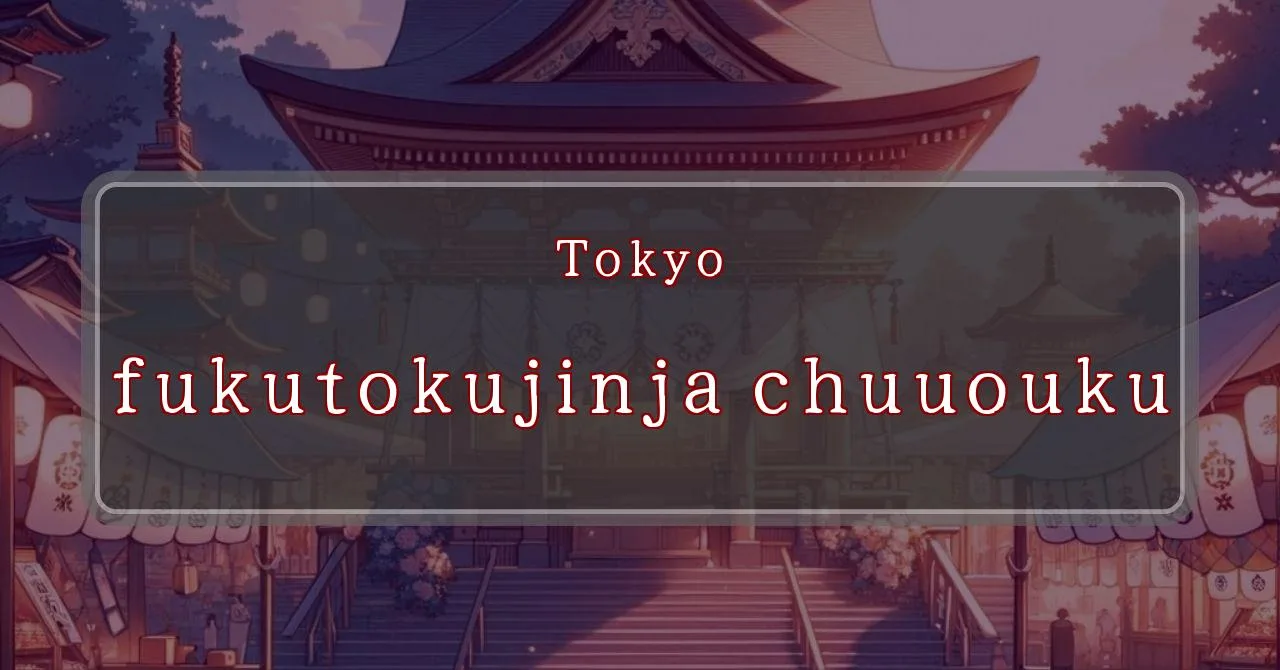Enchanting shrine festival in Tokyo, where history and tradition converge
Basic Information
Fukutoku Shrine is a Shinto shrine located in the Chuo Ward of Tokyo, Japan. It is dedicated to the god Inari, the patron deity of rice and sake, and is known for its association with good fortune and prosperity.
- Address: 2-4-14 Nihonbashi Muromachi, Chuo-ku, Tokyo 103-0022
- Phone Number: 03-3276-3550
- Access: 1-minute walk from A6 exit of Mitsukoshimae Station on the Tokyo Metro Ginza and Hanzomon Lines, or 3-minute walk from Shin-Nihonbashi Station on the JR Sobu Line.
- Festival Days: May 9th, 2024
Main Events and Attractions of the Festival
The Fukutoku Shrine Festival is a lively and colorful event that attracts many visitors each year. The main events and attractions of the festival include:
Mikoshi Procession
The highlight of the festival is the mikoshi procession, which takes place on May 9th. A mikoshi is a portable shrine that is carried through the streets by a team of people. The Fukutoku Shrine mikoshi is a particularly impressive sight, as it is decorated with elaborate carvings and ornaments.
Shishimai Dance
The shishimai dance is a traditional Japanese lion dance that is often performed at festivals. The dance is said to bring good luck and ward off evil spirits. The Fukutoku Shrine Shishimai Dance is performed by a team of skilled dancers who wear colorful lion costumes.
Kagura
Kagura is a traditional Japanese performing art that combines music, dance, and storytelling. Kagura performances are often held at Shinto shrines, and the Fukutoku Shrine Kagura is no exception. The performances are typically very elaborate and feature a variety of costumes and props.
Stalls and Games
In addition to the main events, the Fukutoku Shrine Festival also features a variety of stalls and games. Visitors can enjoy traditional Japanese food and drinks, as well as play games such as ring toss and goldfish scooping. There are also a number of souvenir shops where visitors can purchase items such as amulets and charms.
- Mikoshi Procession: A parade of portable shrines carried through the streets.
- Shishimai Dance: A traditional lion dance performed by skilled dancers.
- Kagura: A sacred Shinto performing art featuring music, dance, and storytelling.
- Stalls and Games: A variety of food stalls, games, and souvenir shops.
Blessings and Deities
Fukutoku Shrine is dedicated to the god Inari, the patron deity of rice and sake, and is known for its association with good fortune and prosperity. Inari is often depicted as a white fox, and there are many fox statues and images at Fukutoku Shrine. Visitors to the shrine can pray for good luck in business, wealth, and family happiness.
- Inari: God of rice and sake, associated with good fortune and prosperity.
- Foxes: Inari is often depicted as a white fox, and there are many fox statues and images at Fukutoku Shrine.
- Blessings: Visitors can pray for good luck in business, wealth, and family happiness.
Origin and History
The origins of Fukutoku Shrine are unclear, but it is believed to have been founded in the 9th century. The shrine was originally located in a different part of Tokyo, but it was moved to its current location in the 17th century. Fukutoku Shrine has a long and rich history, and it has been visited by many famous people over the years, including the Tokugawa shoguns.
- Founded: Believed to have been founded in the 9th century.
- Moved: Relocated to its current location in the 17th century.
- Visitors: Fukutoku Shrine has been visited by many famous people, including the Tokugawa shoguns.
Tips and Notes for Visitors
Fukutoku Shrine is a popular tourist destination, and it can get crowded during festivals and holidays. If you are planning to visit the shrine, it is best to go during the off-season. The shrine is open from 9:00 AM to 5:00 PM every day, and there is no admission fee. Visitors can purchase amulets and other souvenirs at the shrine office.
- Crowds: Fukutoku Shrine can get crowded during festivals and holidays.
- Hours: Open from 9:00 AM to 5:00 PM every day.
- Admission: Free admission.
- Souvenirs: Amulets and other souvenirs can be purchased at the shrine office.
Parking Information
There is no parking lot at Fukutoku Shrine, but there are several public parking lots nearby. The closest parking lot is located just a few minutes’ walk from the shrine. Visitors can also park at the Mitsukoshimae Station parking lot, which is a short walk from the shrine.
- Parking Lot: There is no parking lot at Fukutoku Shrine.
- Nearby Parking: Several public parking lots are located nearby.
- Closest Parking Lot: Located just a few minutes’ walk from the shrine.
- Mitsukoshimae Station Parking Lot: A short walk from the shrine.
Popular Stalls and Food Carts in Recent Years
| Type of Stall | Description |
|---|---|
| Takoyaki | A staple at Japanese festivals. Characterized by a crispy outside and a creamy inside. |
| Jaga Butter | A simple yet popular snack of hot potatoes lavishly topped with melted butter. |
| Baby Castella | Small castella cakes, sweet and fluffy treats enjoyed by children and adults alike. |
| Grilled Ayu with Salt | Fresh ayu fish grilled whole with salt, a savory taste of Japanese summer. |
| Shaapin | A unique gourmet item influenced by foreign cuisine, with a chewy skin wrapping the filling. |
| Okonomiyaki | A Japanese grilled dish where you often choose your own ingredients for a personalized flavor. |
| Cotton Candy | A fluffy, sweet snack that’s extremely popular with children. |
| Chocolate Banana | A banana coated in chocolate, a fun and visually appealing dessert. |
| Kushiyaki | Various types of ingredients skewered and grilled, an easy-to-enjoy snack. |
| Yakisoba | Fried noodles mixed with a special sauce, a fast food favorite in Japan. |



